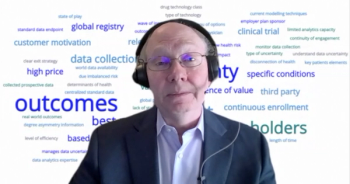
As the cost of therapies increases, US health plans are utilizing tools like step therapy, to ensure patients try cheaper alternatives first, and value assessment frameworks, to assist with the decision-making process.

As the cost of therapies increases, US health plans are utilizing tools like step therapy, to ensure patients try cheaper alternatives first, and value assessment frameworks, to assist with the decision-making process.

Mark Trusheim, MS, BS, strategic director at the NEW Drug Development ParadIGmS program and visiting scientist at Massachusetts Institute of Technology, explains factors involved when considering whether a therapy would be suitable for performance-based contracting.

It is already known that dual-eligible older adults are at an increased risk for death in the year following a stay in the intensive care unit (ICU), but it previously wasn't known whether dual-eligible status is linked with functional decline after an ICU stay.

With more than 3000 gene therapies in development, payers will have to grapple with the challenges of paying for these innovative but expensive therapies.

Patients with refractory or unexplained chronic cough are concerned about how they appear to others, and it takes them many years to get diagnosed, according to posters presented at the American Thoracic Society 2021 International Conference.

Stephanie Lovinsky-Desir, MD, MS, describes her research on the impact of environmental factors on respiratory health among children.

Amy Abernethy, MD, PhD, a hematologist/oncologist and palliative medicine physician, and former Principal Deputy Commissioner of the FDA, discusses new collaborations in the health economics and outcomes research (HEOR) landscape.

Farrah Kheradmand, MD, explains the effects of vaping duration on lung function.

During a panel at Virtual ISPOR 2021, speakers presented global perspectives of COVID-19 vaccine rollout and efforts to target vaccine-hesitant communities.

Fernando Holguin, MD, describes the relationship between comorbid metabolic syndrome and pulmonary disease.

Lou Garrison, PhD, professor emeritus in the Department of Pharmacy at the University of Washington, explains what is needed to optimize use of health technology assessment (HTA) in the fragmented US health care system.

During the ATS 2021 International Conference, several studies shed new light on 2 asthma biologics.

J. Jaime Caro, MDCM, FACP, FRCPC, is chief scientist at Evidera, professor in practice at London School of Economics, and adjunct professor of medicine, epidemiology, and biostatistics at McGill University.

The study presented during the American College of Cardiology's 70th Scientific Session called for one group of hospitals to receive special audits and guidance aimed at improving care of patients with heart failure.

The e-cigarette or vaping product use–associated lung injury epidemic helped jumpstart the regulation of flavored e-cigarettes, said Laura Crotty Alexander, MD, ATSF.

Sessions, posters, and late-breaking trials at the American College of Cardiology’s 70th Scientific Session offer updates on vericiguat, SGLT2 inhibitors, sacubitril/valsartan, and heart failure therapies still in the pipeline.

Two posters presented at Virtual ISPOR 2021 analyzed the health care resource utilization and cost of patients with chronic obstructive pulmonary disease (COPD) with pneumonia, as well as the cost savings of treating patients with frequent or severe COPD exacerbations with a fixed-dose triple therapy.

There was consistent, and significant, benefit across all categories of ejection fraction—preserved, reduced, and midrange—but especially among those with preserved ejection fraction, noted Deepak L. Bhatt, MD, MPH, Brigham and Women’s Hospital Heart & Vascular Center.

Michelle M Cloutier, MD, is professor emerita at UCONN Health in Farmington, Connecticut, and chair of the National Asthma Education and Prevention Program (NAEPP) Coordinating Committee Expert Panel Working Group.

Vivian Lee, MD, PhD, MBA, president of health platforms, Verily Life Sciences, discusses examples of health economics and outcomes research (HEOR) use amid the pandemic to optimize patient care, as well as what impact HEOR may have in the transition to a value-based health care system.

Joe Zein, MD, PhD, outlines how sex and age differences can impact asthma disease course.

There is a possible link between psychological distress and inflammatory markers in younger patients with a history of cardiovascular (CV) disease, specifically myocardial infarction, said Mariana Garcia, MD, cardiology fellow at Emory University.

Stephanie Lovinsky-Desir, MD, MS, discusses the importance of addressing social determinants of health (SDOH) to improve outcomes in pediatric respiratory health.

Two top cardiologists debated evidence involving one clinical trial for omega-3 fatty acids, with implications for another, the REDUCE-IT study for icosapent ethyl (Vascepa).

Genome-wide association studies are building the potential for precision medicine for children with respiratory diseases, but the progress also comes with challenges related to cost and issues with early screening, according to speakers at the ATS 2021 International Conference.

Anthony Fauci, MD, told attendees at the ATS 2021 International Conference that the real-world evidence of vaccines against SARS-CoV-2, the virus that causes COVID-19, is even better than expected.

Heart failure is clearly syndromic, with several phenotypes, so it will remain challenging to reconcile patient to therapy until these unique phenotypes can be studied, stated Clyde W. Yancy, MD, MSc, of Northwestern University’s Feinberg School of Medicine.

The study looked at dapagliflozin's benefits in the acute illness setting, specifically organ protection, according to Mikhail N. Kosiborod, MD, vice president of Research at Saint Luke's Health System.

The Dapagliflozin in Respiratory Failure in Patients With COVID-19 trial is the first phase 3 study to examine whether this SGLT2 inhibitor, which has proven effective for multiple chronic conditions, might be similarly useful in an acute setting.

A pediatric infectious disease expert reviewed some developments in the vaccine development pipeline, especially new efforts targeting infant health through maternal immunizations.

259 Prospect Plains Rd, Bldg H
Cranbury, NJ 08512
© 2025 MJH Life Sciences®
All rights reserved.
